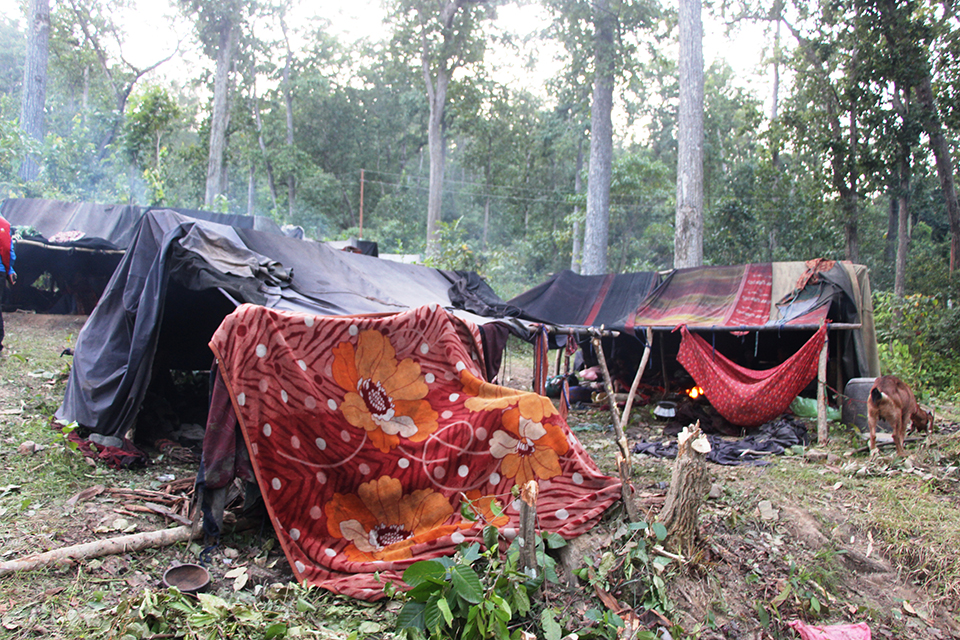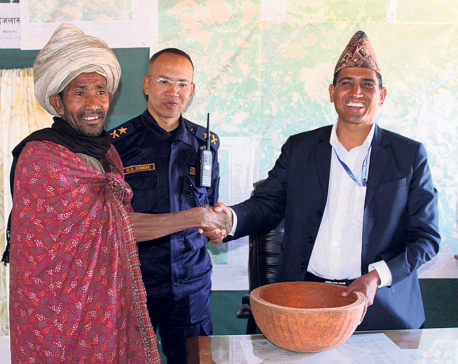
OR
Rautes part their ways on the basis of clan
Published On: October 10, 2018 04:30 AM NPT By: NAGENDRA UPADHYAY AND GOVINDA KC

SURKHET, Oct 10: Raute, the last nomadic tribe of Nepal, has divided its people into clans to make their lives easier. This indigenous tribe has been roaming around the forests of Karali Province. Two weeks ago, they came down from Dailekh to settle in Surkhet after parting their ways.
There are altogether 149 Rautes and they have been divided into three groups on the basis of their clan.
"We have decided to live separately because we have to compete for food and timber if all of us live together in one place," said Bir Bahadur Shahi, chief of Kalyal clan, adding, "We will live separately on other days but will spend the festivals together."
Currently these people have been scattered around Gangate, Kuinepani and Kaltandi of Lekbesi Municipality. This indigenous tribe has three clans and those are Kalyal, Raskoti and Swabanshi. In the past, Rautes used to have a single leader. However, four years ago, three leaders were picked for each clan.
Bir Bahadur Shahi leads Kalyal clan, Surya Narayan Shahi leads Raskoti clan and Dil Bahadur Shahi is the leader of Swabanshi clan.
"After living together for years, it seems like they are heading different ways now," said Bhakta Bahadur Shahi who has long been working with Rautes. According to him, Rautes stopped the tradition of picking one leader and obeying his decision after the retirement of their leader Ain Bahadur Shahi.
Though Ain Bahadur still enjoys the ceremonial role of the chieftain, his decisions are hardly implemented. "After choosing the leaders on the basis of their clans, Rautes of one clan stopped obeying the decisions made by the leader of the other clans," said Ain Bahadur, adding, "Now, even the settlements have been divided." Among the three clans, Raskoti constitute the highest population followed by Kalyal.
Surya Narayan Shahi, chief of Raskoti informed that lack of coordination between the three leaders often brings problem.
The armed conflict of Nepal brought Rautes closer to the other communities. However, getting closer to the modern communities has had more of a negative influence on their culture instead of positive. Earlier, these people used to earn their living by selling wooden crafts and utensils in exchange for food but now they largely rely on begging. Raute youths have almost forgotten the art of making such crafts. In fact, most of them are found spending their days drinking.
You May Like This

Raute group meets officials seeking food aid
JAJARKOT, Feb 7: A group of Raute people from the forests of Surkhet has reached Jajarkot in search of food.... Read More...

Normal life affected as floods, landslides damage roads in Bhojpur
BHOJPUR, July 26: The western belt in Bhojpur district has suffered badly as the road networks have been damaged by... Read More...

Burn-injured Raute youth admitted to Trauma Center, to undergo surgery
KATHMANDU, April 21: Kapil Shahi, a youth of Raute community, who has been suffering from burn injuries for the last... Read More...








Just In
- Mayors' Forum urges Finance Minister Pun to settle electricity dues
- By-Election: Voting underway in Ilam-2 and Bajhang-1(a)
- Save the Children report highlights severe impact of air pollution on children
- NATO Serving as a Catalyst to Fuel Violence
- Home Minister denies any delay in providing relief to wildfire and fire victims
- Ties with Tehran
- CM Kandel requests Finance Minister Pun to put Karnali province in priority in upcoming budget
- Australia reduces TR visa age limit and duration as it implements stricter regulations for foreign students










Leave A Comment